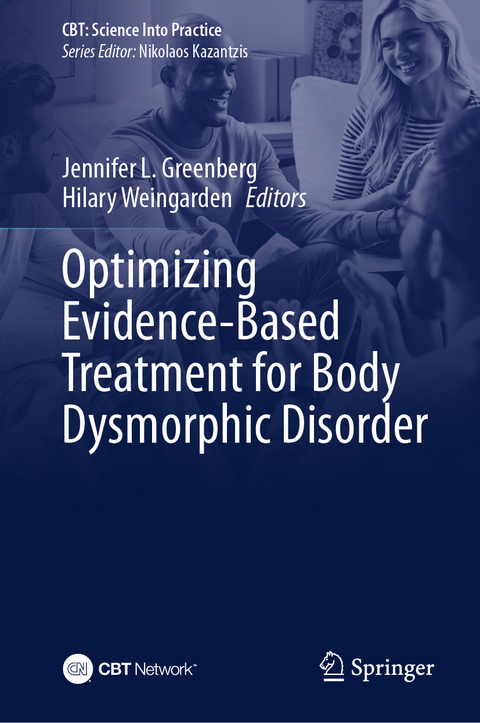
Optimizing Evidence-Based Treatment for Body Dysmorphic Disorder
Springer International Publishing (Verlag)
978-3-031-65338-4 (ISBN)
- Noch nicht erschienen - erscheint am 03.01.2025
- Versandkostenfrei innerhalb Deutschlands
- Auch auf Rechnung
- Verfügbarkeit in der Filiale vor Ort prüfen
- Artikel merken
This book provides an understanding of body dysmorphic disorder (BDD), a psychiatric classification that is characterized by a preoccupation with a perceived or slight imperfection in physical appearance. This disorder lowers quality of life due to time-consuming compulsions intended to hide, fix, or check appearance concerns. Although relatively common, BDD is often not treated appropriately. When untreated, BDD is chronic, severe, and associated with substantial psychosocial impairment and morbidity, including unemployment rates of roughly 40-50%, suicide attempts in 22-28%, and lifetime housebound rates of roughly 30%.This book provides an overview of body dysmorphic disorder (BDD), a psychiatric classification that is characterized by excessively impaired perception of physical attributes that can lead to acute disruption of life activities. BDD is a common disorder, but few clinicians are trained in its assessment and treatment.
This volume provides an evidence-based review of the literature for a greater understanding of the nature of the disorder. Most important, it demonstrates how to effectively assess and treat BDD. Evidence-based psychological and pharmacological treatments are presented, and importantly, ineffective treatments are also reviewed. To optimize CBT for BDD, guidelines are provided to address the most common challenges in diagnosis and treatment, including common comorbidities, differential diagnoses with similar disorders, safety management, addressing low insight or motivation, and modifying treatment for special populations including youth, patients from under-represented backgrounds, and BDD variants. Case examples throughout illuminate for practitioners the theoretical and clinical aspects of this complex problem. This an essential volume for practitioners and clinicians-in-training for gaining perspective on the disorder and its efficacious treatment.
"Integrating research and clinical wisdom of some of the world's leading BDD experts, this book comprehensively covers the foundational as well as more nuanced approaches to treatment. Clinicians from all experience and skill levels who treat BDD will find this book to be a go-to guide to delivering high quality, evidence-based, and individually tailored care."
Jamie Feusner, MD
Professor of Psychiatry, University of Toronto
Jennifer L. Greenberg, PsyD, is Director of Translational Research in the Center for OCD and Related Disorders (CORD) at Massachusetts General Hospital and Assistant Professor of Psychology (Psychiatry) at Harvard Medical School. Dr. Greenberg is a licensed clinical psychologist, recognized internationally for her expertise in the treatment of body image and obsessive compulsive and related disorders (OCRDs) across the lifespan. Her research has focused on developing, testing, and personalizing evidence-based treatments for body dysmorphic disorder (BDD) and related disorders. She has published extensively on cognitive-behavioral therapy, BDD, and OCRDs, and is frequently invited to speak nationally and internationally on these topics. She serves on the Editorial Board of Cognitive and Behavioral Practice. Dr. Greenberg's current work focuses on using digital solutions to improve access to care.
Hilary Weingarden, PhD,is a licensed psychologist in the Center for OCD and Related Disorders at Massachusetts General Hospital (MGH), Assistant Director of the MGH Psychiatry
Center for Digital Mental Health, and Assistant Professor of Psychology (Psychiatry) at Harvard Medical School. Dr. Weingarden conducts research that has been funded by the National Institute of Mental Health, focused on the harmful role of shame in body dysmorphic disorder (BDD) and obsessive compulsive related disorders (OCRDs) and on leveraging technology to enhance the assessment and treatment of BDD and OCRDs. She has published widely on BDD and OCRDs and has been invited to speak nationally and internationally, as well as to media outlets such as WBUR, about BDD and body image. Dr. Weingarden serves on the grant review committee for the International OCD Foundation and editorial board for the Journal of Obsessive Compulsive Related Disorders.Chapter 1. Diagnostic and Clinical Features.- Chapter 2. Comorbidity and Differential Diagnosis.- Chapter 3. Assessment of BDD.- Chapter 4. Barriers to Treatment.- Chapter 5. CBT Model.- Chapter 6. Overview of Evidence-Based Treatment: Psychotherapy.- Chapter 7. Overview of Evidence-Based Treatment: Medication.- Chapter 8. Non-Recommended Treatment.- Chapter 9. Under-Represented Populations and Cross-Cultural Considerations.- Chapter 10. Variants: Muscle Dysmorphia.- Chapter 11. Variants: BDD-by-Proxy.- Chapter 12. Adolescent BDD and the Role of Family in Treatment.
| Erscheint lt. Verlag | 3.1.2025 |
|---|---|
| Reihe/Serie | CBT: Science Into Practice |
| Zusatzinfo | XVII, 218 p. 6 illus. |
| Verlagsort | Cham |
| Sprache | englisch |
| Maße | 155 x 235 mm |
| Themenwelt | Geisteswissenschaften ► Psychologie ► Klinische Psychologie |
| Medizin / Pharmazie ► Medizinische Fachgebiete ► Psychiatrie / Psychotherapie | |
| Schlagworte | body dysmorphia • Body dysmorphic disorder • Evidence-Based Treatment • muscle dysmorphia • pharmacological treatment of BDD |
| ISBN-10 | 3-031-65338-6 / 3031653386 |
| ISBN-13 | 978-3-031-65338-4 / 9783031653384 |
| Zustand | Neuware |
| Haben Sie eine Frage zum Produkt? |
aus dem Bereich


